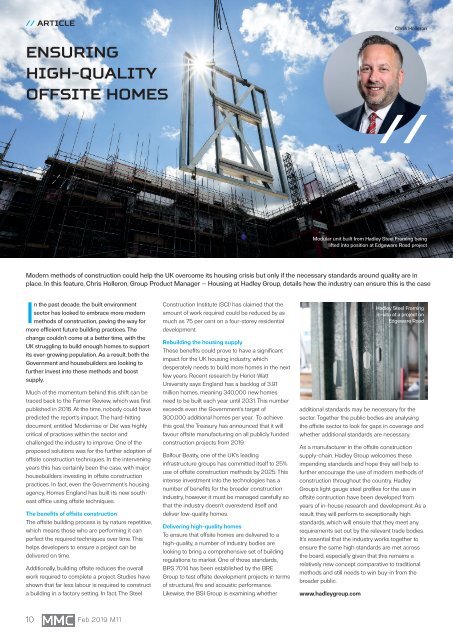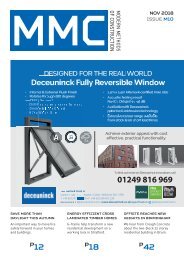a.aa MMC M11 52pp Web
Create successful ePaper yourself
Turn your PDF publications into a flip-book with our unique Google optimized e-Paper software.
article<br />
Chris Holleron<br />
ENSURING<br />
HIGH-QUALITY<br />
OFFSITE HOMES<br />
Modular unit built from Hadley Steel Framing being<br />
lifted into position at Edgeware Road project<br />
Modern methods of construction could help the UK overcome its housing crisis but only if the necessary standards around quality are in<br />
place. In this feature, Chris Holleron, Group Product Manager – Housing at Hadley Group, details how the industry can ensure this is the case<br />
In the past decade, the built environment<br />
sector has looked to embrace more modern<br />
methods of construction, paving the way for<br />
more efficient future building practices. The<br />
change couldn’t come at a better time, with the<br />
UK struggling to build enough homes to support<br />
its ever-growing population. As a result, both the<br />
Government and housebuilders are looking to<br />
further invest into these methods and boost<br />
supply.<br />
Much of the momentum behind this shift can be<br />
traced back to the Farmer Review, which was first<br />
published in 2016. At the time, nobody could have<br />
predicted the report’s impact. The hard-hitting<br />
document, entitled ‘Modernise or Die’ was highly<br />
critical of practices within the sector and<br />
challenged the industry to improve. One of the<br />
proposed solutions was for the further adoption of<br />
offsite construction techniques. In the intervening<br />
years this has certainly been the case, with major<br />
housebuilders investing in offsite construction<br />
practices. In fact, even the Government’s housing<br />
agency, Homes England has built its new southeast<br />
office using offsite techniques.<br />
The benefits of offsite construction<br />
The offsite building process is by nature repetitive,<br />
which means those who are performing it can<br />
perfect the required techniques over time. This<br />
helps developers to ensure a project can be<br />
delivered on time.<br />
Additionally, building offsite reduces the overall<br />
work required to complete a project. Studies have<br />
shown that far less labour is required to construct<br />
a building in a factory setting. In fact, The Steel<br />
Construction Institute (SCI) has claimed that the<br />
amount of work required could be reduced by as<br />
much as 75 per cent on a four-storey residential<br />
development.<br />
Rebuilding the housing supply<br />
These benefits could prove to have a significant<br />
impact for the UK housing industry, which<br />
desperately needs to build more homes in the next<br />
few years. Recent research by Heriot-Watt<br />
University says England has a backlog of 3.91<br />
million homes, meaning 340,000 new homes<br />
need to be built each year until 2031. This number<br />
exceeds even the Government’s target of<br />
300,000 additional homes per year. To achieve<br />
this goal, the Treasury has announced that it will<br />
favour offsite manufacturing on all publicly funded<br />
construction projects from 2019.<br />
Balfour Beatty, one of the UK’s leading<br />
infrastructure groups has committed itself to 25%<br />
use of offsite construction methods by 2025. This<br />
intense investment into the technologies has a<br />
number of benefits for the broader construction<br />
industry, however it must be managed carefully so<br />
that the industry doesn’t overextend itself and<br />
deliver low-quality homes.<br />
Delivering high-quality homes<br />
To ensure that offsite homes are delivered to a<br />
high-quality, a number of industry bodies are<br />
looking to bring a comprehensive set of building<br />
regulations to market. One of those standards,<br />
BPS 7014 has been established by the BRE<br />
Group to test offsite development projects in terms<br />
of structural, fire and acoustic performance.<br />
Likewise, the BSI Group is examining whether<br />
additional standards may be necessary for the<br />
sector. Together the public bodies are analysing<br />
the offsite sector to look for gaps in coverage and<br />
whether additional standards are necessary.<br />
As a manufacturer in the offsite construction<br />
supply-chain, Hadley Group welcomes these<br />
impending standards and hope they will help to<br />
further encourage the use of modern methods of<br />
construction throughout the country. Hadley<br />
Group’s light gauge steel profiles for the use in<br />
offsite contruction have been developed from<br />
years of in-house research and development. As a<br />
result, they will perform to exceptionally high<br />
standards, which will ensure that they meet any<br />
requirements set out by the relevant trade bodies.<br />
It’s essential that the industry works together to<br />
ensure the same high standards are met across<br />
the board, especially given that this remains a<br />
relatively new concept comparative to traditional<br />
methods and still needs to win buy-in from the<br />
broader public.<br />
www.hadleygroup.com<br />
Hadley Steel Framing<br />
in-situ at a project on<br />
Edgeware Road<br />
10 Feb 2019 <strong>M11</strong>
















